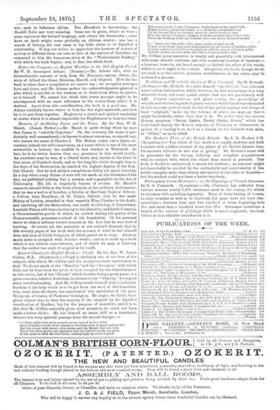Ancient Classics for English Readers : Virgil. By the Rev.
W. Lucas Collins, M.A. (Blackwood.)—Virgil is obviously one of the best of the subjects with which Mr. Collins and his coadjutors have undertaken to deal. We do not speak of the "Bucolic a "and the "Georgics," with which little can be done from the point of view occupied by the contributors to to this series, but of the "fEaeid," which, besides being a great poem, is a great romance, inferior, doubtless, in interest to the "Odyssey," yet a good story notwithstanding. And Mr. Collins avails himself with a judicious freedom of the help which is to be got from the work of the translator who, more than all others, has represented this excellence of the poet. We speak, of course, of Professor Conington. He might, we think, have given of tenor than he does the majesty of the original by the dignified versification of Dryden ; but for the purpose of narrative, and it is to this that Mr. Collins naturally gives most attention, he could not have made a better choice. He has himself no mean skill as a translator, witness this very spirited passage from the second Georgic :— "Co'chian bulls with Eery nostrils never turned Italian field,
Seed of hydra's teeth ne'er sprang in bristling crop of spear and ; But thy slopes with heavy corn-stalks and the Massie vine are clad. There the olive groves are greenest, and the full-fel herds are glad. In thy plain is bred the war-horse, tossing high its crest of pride.
Milk-white herds, 0 fair Clitanuttis: bathe them in thy sacred tide. Mighty bulls to crown the altars, or to draw the conqueror's car Up the Sacred Way in tritunph, when he rideth from the war. Here the spring is longest, summer borrows months beyond her own ; Twice the teeming flocks are fruitful, twice the . laden orchards groan.
.. 1.0! ***** rise thy noble elites, giant works of men of old,
Towns on beetling crags piled heavenward by the hands of builders bold; Antique towers round whose foundations still the grand old rivers glide, And the double sea that girds thee like a fence on either side."
Mr. Collins' prose narrative is simply and gracefully told, interspersed with some shrewd criticism, and with occasional touches of humour,— a humour, however, not broad enough to disturb the effect of the whole, which is, as it ought to be, serious. Altogether, the book, though we do- not rank it as the editor's previous contributions to the series, may he reckoned a success.






























 Previous page
Previous page